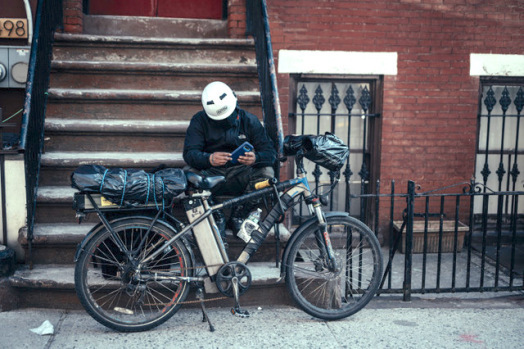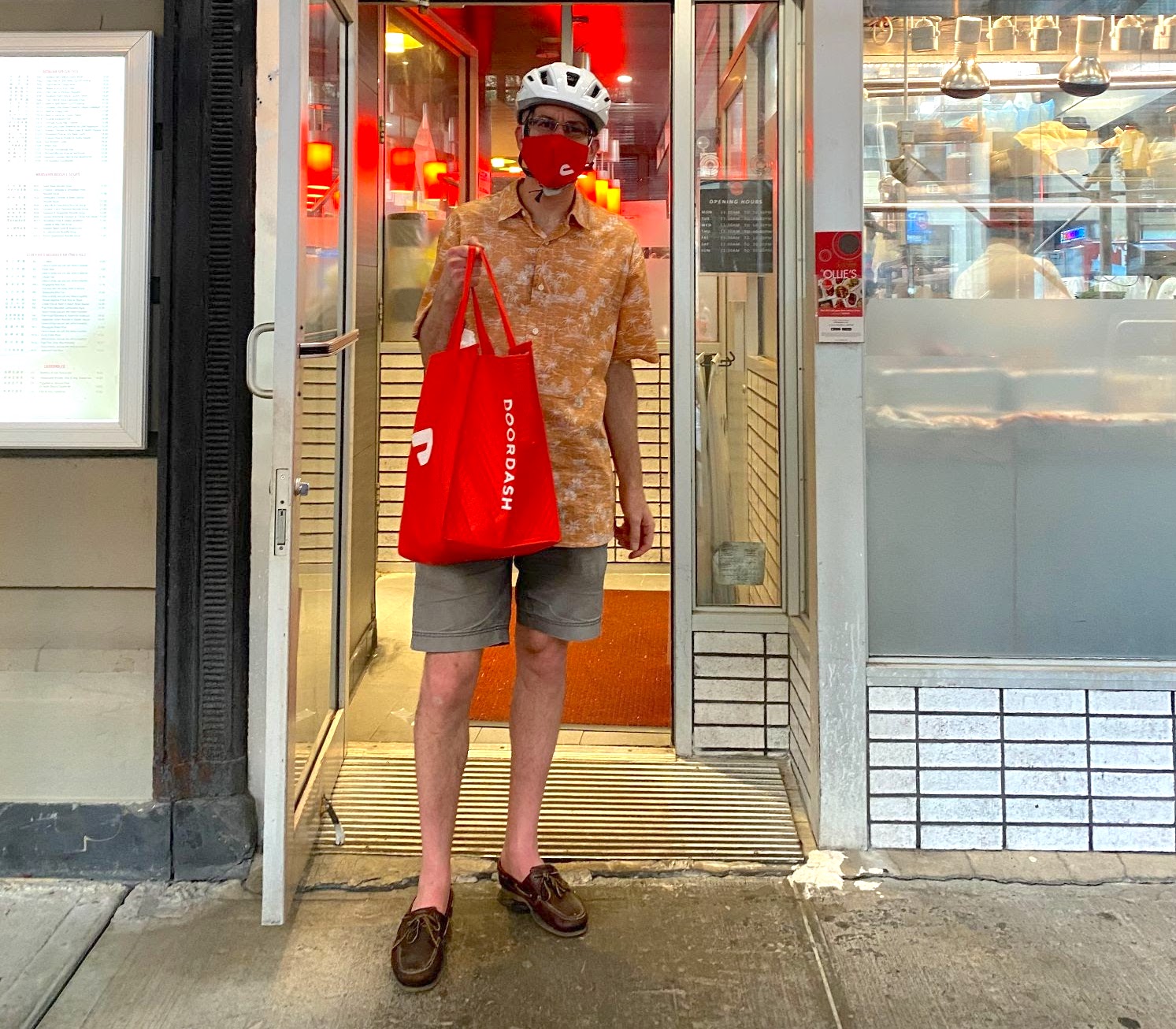Like too many New Yorkers, I’d never given much thought about the individuals who comprise our city’s delivery-cyclist workforce. Mainly, I found them annoying when they rang every buzzer in my building at all hours. Further, at community board, NYPD, and official town-hall meetings, I had heard many complaints (often from the elderly) about cyclists (especially delivery cyclists on e-bikes) riding on sidewalks, riding the wrong way in traffic, or running red lights. Such actions terrify many, stoking a “bikelash” that makes it harder to pass safe-streets initiatives, such as protected bike lanes, and prompting calls for greater enforcement on all cyclists — including of slow cyclists like me.

I knew the deliveristas were hard-working folks in a system that requires them to be fast if they have any hope of making a living, so my first inclination is to not demonize them. But the current conflict made me again start thinking about how economic necessity, rather than disregard for our traffic laws, drives the delivery workers’ behavior. When Manhattan Community Board 7 recently discussed the basic issue of delivery cyclists being denied bathroom access, I decided to sign up with DoorDash to try to better understand delivery riders’ challenges.
I wanted to learn about the underlying factors causing them to endanger themselves and others. I knew that I was unlikely to be denied access to a bathroom, let alone to gain any comprehension of the great challenges deliveristas face daily, from worrying about being able to feed their families to being deported. And, to be clear, in wanting to get a tiny glimpse into the economic factors at play, I do not want to take away the voice of hard-working delivery workers; but I do hope that I can raise concerns that they might not be comfortable raising, for fear of losing their jobs, their livelihoods, or even their ability to remain here.
A key question I had was whether it is even possible to earn New York City’s $15-an-hour minimum wage while riding on a non-electric bike and obeying all traffic laws, including stopping at red lights. In my first attempt last month, I rode my bicycle around the Upper West Side for an hour, going to “hotspots” where I was more likely to get delivery orders. Yet, because I moved much more slowly than e-bike delivery workers, I got no orders and made no money.
Clearly, delivery workers are in an impossible bind.
Next, on June 6, in 90-degree heat, I got an alert from DoorDash that the company needed delivery workers, so I tried again — again following every traffic law and waiting at each red light. In 90 minutes of work — during which I got a new order as soon as I completed one — I only made three deliveries. For this work (which included waiting 20 minutes inside a crowded Chipotle for a $7 delivery) I earned $22.50 in pay and tips — exactly the minimum wage. But if DoorDash hadn’t been so busy, I would not have made even that, especially given that I obeyed the traffic laws. (And, reminder: the minimum wage is a barely livable salary. A full-time worker earning $15 an hour makes just $31,200 per year without any vacation.)
The effort revealed a number of glaring problems with the third-party delivery apps, which use delivery workers as independent contractors, not employees, and so avoid the legal obligations of employers. The DoorDash Independent Contractor Agreement, for example, which is only available in English, makes clear that delivery workers are not employees, and that the agreement “is between two co-equal, independent business enterprises that are separately owned and operated.”
“Co-equal” seems quite a stretch when DoorDash is a publicly traded company with a $47-billion market cap, revenues of close to $3 billion, almost 4,000 employees, and a CEO with an estimated net worth of $2.5 billion, but its workers are not necessarily even making the minimum wage, their biggest asset could be their bike, and they lack many basic labor protections such as workers comp, sick time or days off. The agreement requires that delivery workers carry insurance. (Despite doing a background check of me, DoorDash never asked to see a certificate of insurance.) The agreement also requires that workers indemnify DoorDash from all claims “arising from the performance of delivery services,” including “personal injury or death to any person.”
Further, the app itself is flawed. As one example, for each delivery it only provided the customer’s first name, last initial, and building street address, but not the apartment number. Rather, it instructs the worker to leave each order at the building’s front door and photograph the bag outside the door in order to verify delivery. The app had ways to contact customers by phone and by text, but neither worked for me; I got an error message. The customers nevertheless expected me to bring the food up to their apartments, which I could not do without this information.
One customer, who called me, yelled at me for not bringing the food directly to her apartment. For the next customer, I rang each of the 15 buzzers in her building, eventually getting her attention. (I now see why delivery people do this in my building!) When the customer eventually walked down to the front door, she told me she was expecting that I would bring the food to her apartment. At least she was nice when I explained that I had no way of knowing which apartment was hers. Fortunately, none of the customers gave me a bad (or any) rating, so I haven’t yet been kicked off the platform!

The city has a law requiring that businesses that use bicycles for commercial purposes provide each bicycle operator with a sign for the bike with a unique, three-digit ID number; upper-body apparel with the business’s name and bicyclist’s three-digit ID number, and a bicycle helmet in good condition. The third-party delivery services evade the law, however, by treating the cyclists as independent contractors. DoorDash didn’t even inform me of these legal requirements when I signed up for its service. It did provide me with a stylish DoorDash face mask, a bottle of hand sanitizer, and a DoorDash delivery bag.
Of course our greatest concern must be the safety of the delivery workers and pedestrians who might cross their paths — which does not seem possible until economic conditions enable these workers to deliver food in a safe manner while making a living wage. As Upton Sinclair wrote, “It is difficult to get a man to understand something when his salary depends upon his not understanding it.” These workers must break traffic laws in order to make enough money to survive — a situation that no amount of enforcement will overcome without addressing the economic issues.
Stepped-up enforcement also seems unjust, because for deliveristas each ticket represents several days’ wages, and confiscating their bikes takes away their livelihood. Similarly, the city’s law for commercial cyclists will remain ineffective if the third-party apps have no responsibility or accountability to cyclists as employers.
Again, my personal toe-dip into the difficult lives of delivery workers is in no way meant to take away the voice of these hard-working, exploited people. There are also incredible complexities, such as the need for immigration reform; the over-arching need for more road design changes to make our streets safer for all users; and the need for the third-party apps to allow workers to turn down long, unprofitable deliveries without punishment. What I learned, however, was eye-opening, but also suggested to me that until the deliveristas are classified as employees and not independent contractors, it will be extremely difficult to protect the workers and make our streets safe.
Classifying deliveristas as employees would provide them with essential protections such as the minimum wage, workers comp, disability, unemployment, and overtime benefits. At the same time, they — and the third-party delivery apps — could be held accountable, through the elimination of the loophole allowing DoorDash and others to avoid the city’s requirements for delivery cyclists. [A state bill on this subject is still being negotiated; the City Council also has a package of bills to address some of the issues.]
Making the large companies responsible for compliance with existing mandates — such as the requirement that commercial cyclists wear signs with unique, three-digit ID numbers — would make it easier to enforce egregious violations that endanger pedestrians, such as riding on sidewalks and the wrong way on one-way streets. Companies could be held accountable and liable for the misbehavior of their employees, rather than putting all responsibility and even insurance requirements on workers who are at best barely making minimum wage.
Again, this is just my opinion. I’m sure the workers themselves could say much more about how the current system — which is basically exploiting one class of person to provide speedy convenience for another — could be reformed. But one thing is central to what I learned: We all need to have humility, understanding and recognition about the onerous conditions under which these essential workers toil.
Richard Robbins (@rich1), a small business owner, is a member of Manhattan Community Board 7. All views expressed in this article are his own. CB7 will take up its proposed ban on electric bikes in bike lanes at its full board meeting in July.






